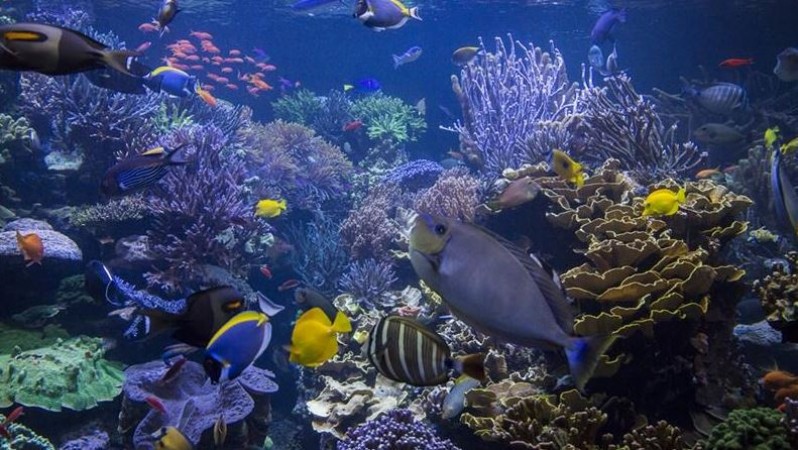
Climate change is one of the most pressing issues facing our planet today. It has far-reaching consequences, affecting various aspects of the environment, including the health of our oceans and marine ecosystems. In this article, we will explore the significant impact of climate change on ocean health and discuss the various challenges faced by marine ecosystems.
1. Introduction: Understanding Climate Change and its Causes
Climate change refers to long-term shifts in temperature, precipitation patterns, wind patterns, and other aspects of the Earth's climate system. It is primarily caused by human activities, including the burning of fossil fuels, deforestation, and industrial processes. These activities release greenhouse gases into the atmosphere, leading to the greenhouse effect and subsequent global warming.
2. Rising Sea Temperatures and Coral Bleaching
As the Earth's temperature rises, so do sea surface temperatures. Increased heat in the oceans poses a significant threat to coral reefs. Coral bleaching occurs when corals expel the symbiotic algae living within their tissues, causing them to turn white. Bleached corals are stressed and vulnerable to disease, leading to their eventual death if conditions do not improve.
3. Ocean Acidification and its Effects on Marine Life
Increased levels of carbon dioxide (CO2) in the atmosphere are absorbed by the oceans, leading to ocean acidification. When CO2 dissolves in seawater, it forms carbonic acid, which lowers the pH of the water. Acidic waters pose a threat to marine organisms with calcium carbonate shells, such as shellfish, corals, and some plankton species. Acidification can weaken their shells, making them more susceptible to damage and inhibiting their growth.
4. Melting Polar Ice Caps and Rising Sea Levels
Climate change is causing the polar ice caps to melt at an alarming rate. As a result, sea levels are rising, posing risks to coastal areas and low-lying islands. Rising sea levels lead to increased coastal erosion, flooding, and saltwater intrusion into freshwater sources. These changes threaten the habitats of numerous marine species, including nesting sites for sea turtles and breeding grounds for migratory birds.
5. Altered Ocean Currents and Disrupted Migration Patterns
Climate change can disrupt ocean currents, which play a crucial role in distributing heat around the globe. Alterations in these currents can impact marine ecosystems by affecting nutrient availability, food webs, and the migration patterns of marine species. Changes in migration patterns can disrupt breeding cycles, alter predator-prey relationships, and even result in population declines.
6. Depletion of Marine Biodiversity
The health of marine ecosystems relies on a diverse array of species, each playing a unique role. Climate change threatens this biodiversity by directly impacting species' habitats and altering the delicate balance of ecosystems. The loss of biodiversity can have cascading effects throughout the food chain and ecosystem, affecting everything from primary producers like phytoplankton to top predators like sharks.
7. Impacts on Coastal Communities and Economies
Coastal communities depend on the ocean for their livelihoods, whether through fishing, tourism, or other marine-related industries. Climate change can disrupt these economic activities by damaging marine ecosystems, depleting fish stocks, and increasing the frequency and intensity of extreme weather events such as hurricanes. The loss of income and livelihoods can have severe social and economic consequences for these communities.
8. Mitigation Strategies to Address Climate Change and Protect Ocean Health
To address the impact of climate change on ocean health and marine ecosystems, it is crucial to reduce greenhouse gas emissions and promote sustainable practices. Some key mitigation strategies include:
Transitioning to renewable energy sources to reduce reliance on fossil fuels.
Conserving and restoring coastal habitats such as mangroves, salt marshes, and seagrass beds, which act as natural buffers against storms and help sequester carbon.
Implementing sustainable fishing practices to protect fish stocks and reduce bycatch.
Raising awareness and promoting education about the importance of ocean conservation and climate change.
9. Conclusion
Climate change poses significant challenges to the health of our oceans and marine ecosystems. Rising sea temperatures, ocean acidification, melting polar ice caps, disrupted migration patterns, and the depletion of marine biodiversity are just some of the impacts. These changes not only affect the delicate balance of marine ecosystems but also have far-reaching consequences for coastal communities and economies. It is crucial that we take immediate action to mitigate climate change and protect the health of our oceans for future generations.
Poor Dental Health is Associated with Brain Shrinkage
The Rise of Plant-Based Meat Alternatives and their Environmental Benefits
Cystic Fibrosis Treatment: Triple Combination Therapy Shows Remarkable Results